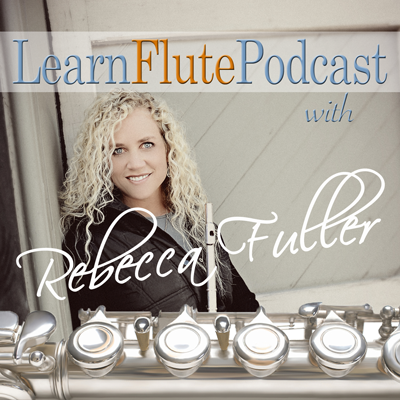Learn Flute Podcast SHOW NOTES:
You’ll learn:
- Information on this podcast is supplemental to LearnFluteOnline.com
- How to get better at remembering music.
- What tactics Rebecca uses.
- A good visual example.
- Reasons why it is beneficial to learn to do this.
Learn Flute Podcast 122
Press the Play Button to Listen Now:
Podcast Transcript
How to get better at remembering music? Ahh an age-old question that many people ask me here at Learn Flute Online. Well, the good news is that I have answers for you. Let’s get started!
Well hello and welcome welcome to this Learn Flute Podcast episode.. I’m Rebecca Fuller, your expert and instructor here, and I’m not sure what number of podcast we’re on right now, but we’re into the hundreds – and it’s fun to know that all the knowledge I’ve accumulated over my lifetime is documented and received by you good listeners. I truly do appreciate you and I love how many of you return to these episodes over and over while you are working on and learning to enjoy playing the flute with us.
I do love receiving comments and progress updates from all of you… especially those who are in our private community – we have such a good time in there, and it always makes me have my proud-mama moments as I watch you go from a budding musician into a practicing musician, and then into proficiency. Oh wow! It’s really what I live for. I’ve spent the past .. well, thirty three or more years of my life teaching and inspiring flutists of all ages to be their best. And, if you’re someone I’ve worked with..
Thank you and congratulations both. I can’t wait for even more fun to come!
One thing I like to do is answer questions about musicianship and flute playing specifically. I find the subject fascinating, and because you’re here listening today, I suspect you’re headed on the same path. In fact, as part of our members area in the Learn Flute Online programs, I hold regular Q&A’s – and we have a great time with these question and answer sessions. I like when we rapid fire these because it gets us all jazzed up and lights our minds on fire with the possibilities and also as we discover solutions to issues or questions ya’ll might have.
Some of these questions are kind of vague and some are super specific. I wonder when the last time you thought, “gee, I wish I could ask a professional flute teacher about this..”
Well, when you’re a part of the Learn Flute Online program, you get this chance every day. It’s so much fun!
Today I thought we’d explore one of the kind of general questions I get asked often, and that is how to get better at remembering music. Hmm, how can we learn to remember what we’re supposed to play? That’s a really great question, actually. Let’s explore the answer from a couple of different angles, shall we? Great!
I actually stumbled upon an article that I wrote and published like 10 years ago that is on this exact same subject. I quickly read it, and I’m happy to find out that my answers are basically the same now but I think a more long-winded answer is appropriate, so let’s realize first that our brain creates memory links with the pieces and exercises that we play. How can we ‘do’ this better so that we can more efficiently and more quickly remember what we’ve done?
Well, the answer can be found in those moments when we focus a bit and also when we repeat it over and over with the intent of doing it better each time.
Ahem. This is also called “practicing”.
We make memory links during these practice times, and as we do it more and more our links get stronger and stronger. Think of our every repetitive moment as like creating a chain.. The longer and the more often we do it, the stronger the links get until they are pretty much unforgettable and unbreakable.. Or at least, a very strong foundation is made.
Every year I spend a month or so helping my students focus on some important foundations of playing flute and musicianship. We really work hard during these weeks, and it takes a lot of repetitions to get to where we want to be. And that’s okay.
It’s also surprising to many people that they can’t just muscle their way into having strong memory links for certain skills. What I mean by this is that they find it a little bit unnerving that they can’t just cram-study and suddenly have all the muscle memory and perfect skill they want. Haha, I WISH this was possible (Cram study means do it all in the very last moments).
Music is one of those things that is most effectively and best done in perfectly-played bites, like tiny little bites played many times over many days, weeks, and months.. And years.
Take our LFO scales challenge for one example that we do every year here at Learn Flute Online. If you’re a member here you know exactly what I’m talking about. It truly is impossible to study and learn what is needed for this challenge in a super short time. This is why I’ve designed our learning the way I do here – we get to spiral through the levels, revisit the same old skills with new small twists that keep us moving upwards and onwards always.
Focusing and repeating a tricky passage ten or twenty times a day is a perfect idea.. What isn’t a perfect idea is to wait until the night before your lesson and try to put in all, say two hundred and eighty repeats. It’s a real thing that our brains can only handle so much of this type of repeat practice. After ten or twenty we’re really not going to be as effective, so it’s best to give it a rest and then work on it again the next day.
Also, it’s really imperative to realize that our brain and body only remembers what it has been taught. So if you play a passage, say 13 times in a row and have the same blurpy spot where the same exact problem happens each time…
For example: each time you play the B flat scale, it’s possible that you forget to bring your first finger UP on both the second octave E flat and the D as you descend from the top on your way back to the bottom note. Hm, you better check that.
This, by the way, is a pretty common mistake, so this is why I bring it up. The ONLY way to have this skill one hundred percent perfect all the time and for the rest of forever more, is to have worked on it one hundred percent perfect all the time. Whoa… wait – did you think I just said you had to be perfect?
Well, yes, and No.
No, I know you’re not perfect because you’re a human like me… and this is just how we are. We TRY really hard to be perfect though, and eventually, we really do get there.
And YES, I do expect you to focus and practice perfectly. As perfectly as you understand how to. Haha so, here’s the explanation for this: Since your brain only remembers what it has been fed, then it’s the most efficient and best idea to play no faster than we can actually play “it” perfectly, whatever it is, right.
In fact, it doesn’t matter how slowly we play while learning something. You can play so slow that you have time to hang the laundry between your notes. Haha, just kidding, but it is more important that your brain sees, feels, and remembers the correct movements and processes- speed should not be a focus when learning or fixing a skill.
I repeat, it’s the most important thing to isolate the movement or moment in question and repeat it ever so slowly in a pattern of focused-on repeats. This is how you slow down in order to speed up.
We talk about this all the time at Learn Flute Online. So, you’ll get more of this in the members area.. And it’s one of the reasons my students do so well. So again it really is great having you here learning this.
Here are some more specific tips for you since you are in the position where you are kind of self-diagnosing and learning to prescribe yourself what you need during many practice sessions.
It’s a good idea to look at your music as lets say a culmination, a composite, whatever you want to call it- of many different pieces and parts.
If you take the pieces and parts that we’re talking about here, and find the ones that are giving you fits, and you isolate them, you are already on the road to recovery. First, separate each of these types of sections into three categories, one of three categories. With the first being the phrases that are easy and familiar.
You can just pat yourself on the back for these, and we can focus on the others more- which are the passages that have some small stumbles in them and the last section of these three being the parts that just plain feel too hard or difficult.
If you can imagine this, it will really help. So these three different things. If you took a piece of sheet music, and you chopped it up with scissors, cut the pieces and parts and separated them all over the floor into these three categories.
What do you see in front of yourself now? Big piles of paper.
Are your piles of paper scraps the same size? Are the piles the same?
Probably they won’t be (unless you’ve chosen an entire piece that’s waaay out of your league for the moment).
Usually, your pile of what’s easier and familiar will be your biggest right, and the area where you’ve put the most difficult parts is the smallest.
Looking at and shaping our practice sessions around this concept can be very, very effective. Having everything broken down into little bits that our brains can more easily chew, really is the way to go. Then, we just have to keep at it.
So, thinking of our piece not from beginning to end as being how we have to practice but instead finding the little bits and pieces and categorizing them, so we can work on them for effectively.
Of course, we have to make space in our day for lots of fun also.. Problem and troubleshooting non-stop is a good way to feel tired and non-motivated, so finding and learning to keep perspective in our musical life is a big deal also.
I like to remind us to have healthy repetition sessions within our practice time. This means that we get to pat ourselves on the back as we do things right and keep on the path, and when things are kind of lumpy and bumpy and we have to slow way down to get things correct, then we take these moments in stride and realize that we’re just moving through the feedback process. Recognizing that we just need to adjust something is just feedback – and easy to deal with when we think of it this way.
Take it, focus on it, slow way down, do it again. Analyze what just happened and do it again. And again. And then find out, can you make it to ten with them all right? If so, you are golden! No matter the tempo. Now of course, the slower the better on this first ten or twenty for sure.
Remember we’re learning how to remember – so this is how to do it. Sometimes it will be an issue of notes or fingerings, sometimes it will be remembering a dynamic or maybe an articulation. The process for making it into your memory chain is the same.
The best news is that these memories you make and the chains that connect them are reusable… meaning, the same skills will pop up over and over, dozens, hundreds, and thousands of times over the next few years of making music. And once you’ve made strong memory chains of flute skills, your overall musicianship will continue to spiral upwards as you learn to recognize these same ideas in all of the music that you play.
I want to separate this next section for you because I feel it’s important to talk about all by itself. Making music and playing an instrument is definitely physical. No getting around that. We use our bodies to create the sound. No doubt.
But, what I want to present to you right now is that music making is also very, very emotional. The effort that goes into continuing month after month and year after year is emotional, and the attitude we have when we are practicing is quite important.
What we believe and how we talk to ourselves while we play our instrument will create and color our memory chains just as much as what our fingers and lips are doing.
As our body and our brain create these memory links for the skills and passages we practice, we are also creating kind of like a side-effect at the same time. This all centers around our healthy or unhealthy outlook on ourselves and it’s stuck right on that memory chain we’ve been trying so hard to craft.
Now, If you’ve studied with a teacher on a power trip before, then you know what un-fun this can create. Don’t be that teacher for yourself.
Use what I teach you here to craft your practice sessions from the modules I’ve already designed for you. All the pieces for the adventure are there.
So, for the past few minutes I’ve been laying out the case for how to get better at remembering music. Now we’re not necessarily talking about how to memorize music right, we’re talking about how to get better at remembering music in general. How are we doing so far?
If you had to give this speech back to someone you know, could you? What would you say? What sticks out the most for you so far?
Mm, perhaps you can skip back and play this episode again because I feel you’ll find the golden nuggets you’ve been looking for to really help you gain more clarity and confidence as a flute player as you learn and have so much fun.
Yes?
Yes.
Okay great, well as usual it’s a pleasure to be here with you exploring and learning together. My mission in life has been to touch as many budding musicians as possible in hopes that the live music makers live on and pass it on themselves for many, many generations to come.
I love you all, wish you well, and I can’t wait to see you in an upcoming module lesson again soon!
Let’s enjoy today even more by taking these skills of how to get better at remembering music and organizing them so we can use them to our full advantage to be better and more fulfilled people.
I’ll play you out now – see you soon!
Thank you for Tuning In!
Please consider subscribing and taking a minute to leave a review and rating for the podcast on iTunes.
I hope you’ve enjoyed learning about how to better remember your music. Join us for the next episode!









What is the side effect mentioned in The passage starting with: “As our body and brain…”?
Hi Anders, in this context I’m talking about making an unconscious side-effect of how we view and feel about ourselves. Confidence is a big factor in how we approach education. Working on skills and gaining confidence in learning and our abilities will take us a long way! Glad you asked. Keep it up here. 🙂 Rebecca